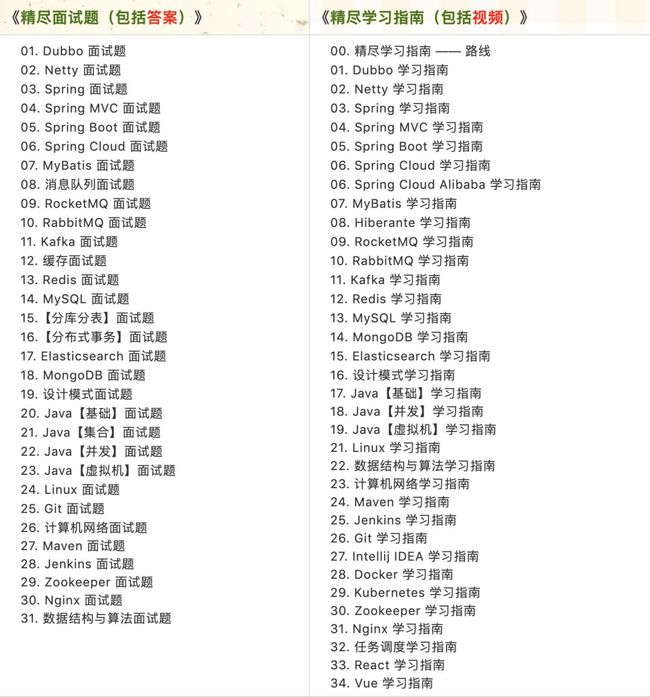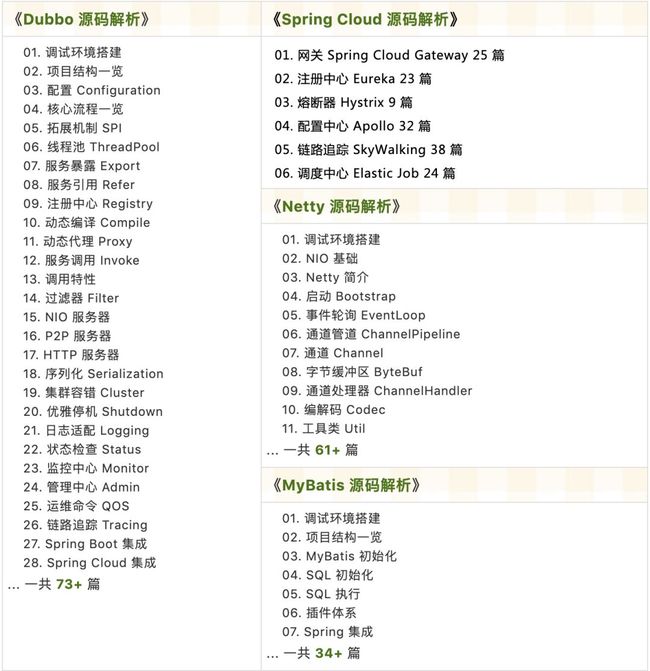给你 2 万条数据,怎么快速导入到 MySQL?写得太好了!
点击上方“Java基基”,选择“设为星标”
做积极的人,而不是积极废人!
每天 14:00 更新文章,每天掉亿点点头发...
源码精品专栏
原创 | Java 2021 超神之路,很肝~
中文详细注释的开源项目
RPC 框架 Dubbo 源码解析
网络应用框架 Netty 源码解析
消息中间件 RocketMQ 源码解析
数据库中间件 Sharding-JDBC 和 MyCAT 源码解析
作业调度中间件 Elastic-Job 源码解析
分布式事务中间件 TCC-Transaction 源码解析
Eureka 和 Hystrix 源码解析
Java 并发源码
来源:blog.csdn.net/kisscatforever/
article/details/79817039
一、前言
二、直接把list怼进Mysql
三、分组把list导入Mysql中
四、多线程分批导入Mysql
五、小结
一、前言
前两天做了一个导入的功能,导入开始的时候非常慢,导入2w条数据要1分多钟,后来一点一点的优化,从直接把list怼进Mysql中,到分配把list导入Mysql中,到多线程把list导入Mysql中。时间是一点一点的变少了。非常的爽,最后变成了10s以内。下面就展示一下过程。
基于 Spring Boot + MyBatis Plus + Vue & Element 实现的后台管理系统 + 用户小程序,支持 RBAC 动态权限、多租户、数据权限、工作流、三方登录、支付、短信、商城等功能。
项目地址:https://github.com/YunaiV/ruoyi-vue-pro
二、直接把list怼进Mysql
使用mybatis的批量导入操作:
@Transactional(rollbackFor = Exception.class)
public int addFreshStudentsNew2(List list, String schoolNo) {
if (list == null || list.isEmpty()) {
return 0;
}
List studentEntityList = new LinkedList<>();
List enrollStudentEntityList = new LinkedList<>();
List allusersEntityList = new LinkedList<>();
for (FreshStudentAndStudentModel freshStudentAndStudentModel : list) {
EnrollStudentEntity enrollStudentEntity = new EnrollStudentEntity();
StudentEntity studentEntity = new StudentEntity();
BeanUtils.copyProperties(freshStudentAndStudentModel, studentEntity);
BeanUtils.copyProperties(freshStudentAndStudentModel, enrollStudentEntity);
String operator = TenancyContext.UserID.get();
String studentId = BaseUuidUtils.base58Uuid();
enrollStudentEntity.setId(BaseUuidUtils.base58Uuid());
enrollStudentEntity.setStudentId(studentId);
enrollStudentEntity.setIdentityCardId(freshStudentAndStudentModel.getIdCard());
enrollStudentEntity.setOperator(operator);
studentEntity.setId(studentId);
studentEntity.setIdentityCardId(freshStudentAndStudentModel.getIdCard());
studentEntity.setOperator(operator);
studentEntityList.add(studentEntity);
enrollStudentEntityList.add(enrollStudentEntity);
AllusersEntity allusersEntity = new AllusersEntity();
allusersEntity.setId(enrollStudentEntity.getId());
allusersEntity.setUserCode(enrollStudentEntity.getNemtCode());
allusersEntity.setUserName(enrollStudentEntity.getName());
allusersEntity.setSchoolNo(schoolNo);
allusersEntity.setTelNum(enrollStudentEntity.getTelNum());
allusersEntity.setPassword(enrollStudentEntity.getNemtCode()); //密码设置为考生号
allusersEntityList.add(allusersEntity);
}
enResult = enrollStudentDao.insertAll(enrollStudentEntityList);
stuResult = studentDao.insertAll(studentEntityList);
allResult = allusersFacade.insertUserList(allusersEntityList);
if (enResult > 0 && stuResult > 0 && allResult) {
return 10;
}
return -10;
} Mapper.xml
insert into tb_enroll_student
id,
remark,
nEMT_aspiration,
nEMT_code,
nEMT_score,
student_id,
identity_card_id,
level,
major,
name,
nation,
secondary_college,
operator,
sex,
is_delete,
account_address,
native_place,
original_place,
used_name,
pictrue,
join_party_date,
political_status,
tel_num,
is_registry,
graduate_school,
create_time,
update_time
values
(
#{item.id,jdbcType=VARCHAR},
#{item.remark,jdbcType=VARCHAR},
#{item.nemtAspiration,jdbcType=VARCHAR},
#{item.nemtCode,jdbcType=VARCHAR},
#{item.nemtScore,jdbcType=VARCHAR},
#{item.studentId,jdbcType=VARCHAR},
#{item.identityCardId,jdbcType=VARCHAR},
#{item.level,jdbcType=VARCHAR},
#{item.major,jdbcType=VARCHAR},
#{item.name,jdbcType=VARCHAR},
#{item.nation,jdbcType=VARCHAR},
#{item.secondaryCollege,jdbcType=VARCHAR},
#{item.operator,jdbcType=VARCHAR},
#{item.sex,jdbcType=VARCHAR},
0,
#{item.accountAddress,jdbcType=VARCHAR},
#{item.nativePlace,jdbcType=VARCHAR},
#{item.originalPlace,jdbcType=VARCHAR},
#{item.usedName,jdbcType=VARCHAR},
#{item.pictrue,jdbcType=VARCHAR},
#{item.joinPartyDate,jdbcType=VARCHAR},
#{item.politicalStatus,jdbcType=VARCHAR},
#{item.telNum,jdbcType=VARCHAR},
#{item.isRegistry,jdbcType=TINYINT},
#{item.graduateSchool,jdbcType=VARCHAR},
now(),
now()
)
代码说明:
底层的mapper是通过逆向工程来生成的,批量插入如下,是拼接成类似:insert into tb_enroll_student()values (),()…….();
这样的缺点是,数据库一般有一个默认的设置,就是每次sql操作的数据不能超过4M。这样插入,数据多的时候,数据库会报错Packet for query is too large (6071393 > 4194304). You can change this value on the server by setting the max_allowed_packet' variable.,虽然我们可以通过
类似 修改 my.ini 加上 max_allowed_packet =67108864,67108864=64M,默认大小4194304 也就是4M
修改完成之后要重启mysql服务,如果通过命令行修改就不用重启mysql服务。
完成本次操作,但是我们不能保证项目单次最大的大小是多少,这样是有弊端的。所以可以考虑进行分组导入。
基于微服务的思想,构建在 B2C 电商场景下的项目实战。核心技术栈,是 Spring Boot + Dubbo 。未来,会重构成 Spring Cloud Alibaba 。
项目地址:https://github.com/YunaiV/onemall
三、分组把list导入Mysql中
同样适用mybatis批量插入,区别是对每次的导入进行分组计算,然后分多次进行导入:
@Transactional(rollbackFor = Exception.class)
public int addFreshStudentsNew2(List list, String schoolNo) {
if (list == null || list.isEmpty()) {
return 0;
}
List studentEntityList = new LinkedList<>();
List enrollStudentEntityList = new LinkedList<>();
List allusersEntityList = new LinkedList<>();
for (FreshStudentAndStudentModel freshStudentAndStudentModel : list) {
EnrollStudentEntity enrollStudentEntity = new EnrollStudentEntity();
StudentEntity studentEntity = new StudentEntity();
BeanUtils.copyProperties(freshStudentAndStudentModel, studentEntity);
BeanUtils.copyProperties(freshStudentAndStudentModel, enrollStudentEntity);
String operator = TenancyContext.UserID.get();
String studentId = BaseUuidUtils.base58Uuid();
enrollStudentEntity.setId(BaseUuidUtils.base58Uuid());
enrollStudentEntity.setStudentId(studentId);
enrollStudentEntity.setIdentityCardId(freshStudentAndStudentModel.getIdCard());
enrollStudentEntity.setOperator(operator);
studentEntity.setId(studentId);
studentEntity.setIdentityCardId(freshStudentAndStudentModel.getIdCard());
studentEntity.setOperator(operator);
studentEntityList.add(studentEntity);
enrollStudentEntityList.add(enrollStudentEntity);
AllusersEntity allusersEntity = new AllusersEntity();
allusersEntity.setId(enrollStudentEntity.getId());
allusersEntity.setUserCode(enrollStudentEntity.getNemtCode());
allusersEntity.setUserName(enrollStudentEntity.getName());
allusersEntity.setSchoolNo(schoolNo);
allusersEntity.setTelNum(enrollStudentEntity.getTelNum());
allusersEntity.setPassword(enrollStudentEntity.getNemtCode()); //密码设置为考生号
allusersEntityList.add(allusersEntity);
}
int c = 100;
int b = enrollStudentEntityList.size() / c;
int d = enrollStudentEntityList.size() % c;
int enResult = 0;
int stuResult = 0;
boolean allResult = false;
for (int e = c; e <= c * b; e = e + c) {
enResult = enrollStudentDao.insertAll(enrollStudentEntityList.subList(e - c, e));
stuResult = studentDao.insertAll(studentEntityList.subList(e - c, e));
allResult = allusersFacade.insertUserList(allusersEntityList.subList(e - c, e));
}
if (d != 0) {
enResult = enrollStudentDao.insertAll(enrollStudentEntityList.subList(c * b, enrollStudentEntityList.size()));
stuResult = studentDao.insertAll(studentEntityList.subList(c * b, studentEntityList.size()));
allResult = allusersFacade.insertUserList(allusersEntityList.subList(c * b, allusersEntityList.size()));
}
if (enResult > 0 && stuResult > 0 && allResult) {
return 10;
}
return -10;
} 代码说明:
这样操作,可以避免上面的错误,但是分多次插入,无形中就增加了操作实践,很容易超时。所以这种方法还是不值得提倡的。
再次改进,使用多线程分批导入。
四、多线程分批导入Mysql
依然使用mybatis的批量导入,不同的是,根据线程数目进行分组,然后再建立多线程池,进行导入。
@Transactional(rollbackFor = Exception.class)
public int addFreshStudentsNew(List list, String schoolNo) {
if (list == null || list.isEmpty()) {
return 0;
}
List studentEntityList = new LinkedList<>();
List enrollStudentEntityList = new LinkedList<>();
List allusersEntityList = new LinkedList<>();
list.forEach(freshStudentAndStudentModel -> {
EnrollStudentEntity enrollStudentEntity = new EnrollStudentEntity();
StudentEntity studentEntity = new StudentEntity();
BeanUtils.copyProperties(freshStudentAndStudentModel, studentEntity);
BeanUtils.copyProperties(freshStudentAndStudentModel, enrollStudentEntity);
String operator = TenancyContext.UserID.get();
String studentId = BaseUuidUtils.base58Uuid();
enrollStudentEntity.setId(BaseUuidUtils.base58Uuid());
enrollStudentEntity.setStudentId(studentId);
enrollStudentEntity.setIdentityCardId(freshStudentAndStudentModel.getIdCard());
enrollStudentEntity.setOperator(operator);
studentEntity.setId(studentId);
studentEntity.setIdentityCardId(freshStudentAndStudentModel.getIdCard());
studentEntity.setOperator(operator);
studentEntityList.add(studentEntity);
enrollStudentEntityList.add(enrollStudentEntity);
AllusersEntity allusersEntity = new AllusersEntity();
allusersEntity.setId(enrollStudentEntity.getId());
allusersEntity.setUserCode(enrollStudentEntity.getNemtCode());
allusersEntity.setUserName(enrollStudentEntity.getName());
allusersEntity.setSchoolNo(schoolNo);
allusersEntity.setTelNum(enrollStudentEntity.getTelNum());
allusersEntity.setPassword(enrollStudentEntity.getNemtCode()); //密码设置为考生号
allusersEntityList.add(allusersEntity);
});
int nThreads = 50;
int size = enrollStudentEntityList.size();
ExecutorService executorService = Executors.newFixedThreadPool(nThreads);
List> futures = new ArrayList>(nThreads);
for (int i = 0; i < nThreads; i++) {
final List EnrollStudentEntityImputList = enrollStudentEntityList.subList(size / nThreads * i, size / nThreads * (i + 1));
final List studentEntityImportList = studentEntityList.subList(size / nThreads * i, size / nThreads * (i + 1));
final List allusersEntityImportList = allusersEntityList.subList(size / nThreads * i, size / nThreads * (i + 1));
Callable task1 = () -> {
studentSave.saveStudent(EnrollStudentEntityImputList,studentEntityImportList,allusersEntityImportList);
return 1;
};
futures.add(executorService.submit(task1));
}
executorService.shutdown();
if (!futures.isEmpty() && futures != null) {
return 10;
}
return -10;
} 代码说明:
上面是通过应用ExecutorService 建立了固定的线程数,然后根据线程数目进行分组,批量依次导入。一方面可以缓解数据库的压力,另一个面线程数目多了,一定程度会提高程序运行的时间。缺点就是要看服务器的配置,如果配置好的话就可以开多点线程,配置差的话就开小点。
五、小结
通过使用这个操作真是不断的提高了,项目使用技巧也是不错。加油~~ 多线程哦~~
欢迎加入我的知识星球,一起探讨架构,交流源码。加入方式,长按下方二维码噢:
已在知识星球更新源码解析如下:
最近更新《芋道 SpringBoot 2.X 入门》系列,已经 101 余篇,覆盖了 MyBatis、Redis、MongoDB、ES、分库分表、读写分离、SpringMVC、Webflux、权限、WebSocket、Dubbo、RabbitMQ、RocketMQ、Kafka、性能测试等等内容。
提供近 3W 行代码的 SpringBoot 示例,以及超 6W 行代码的电商微服务项目。
获取方式:点“在看”,关注公众号并回复 666 领取,更多内容陆续奉上。
文章有帮助的话,在看,转发吧。
谢谢支持哟 (*^__^*)




